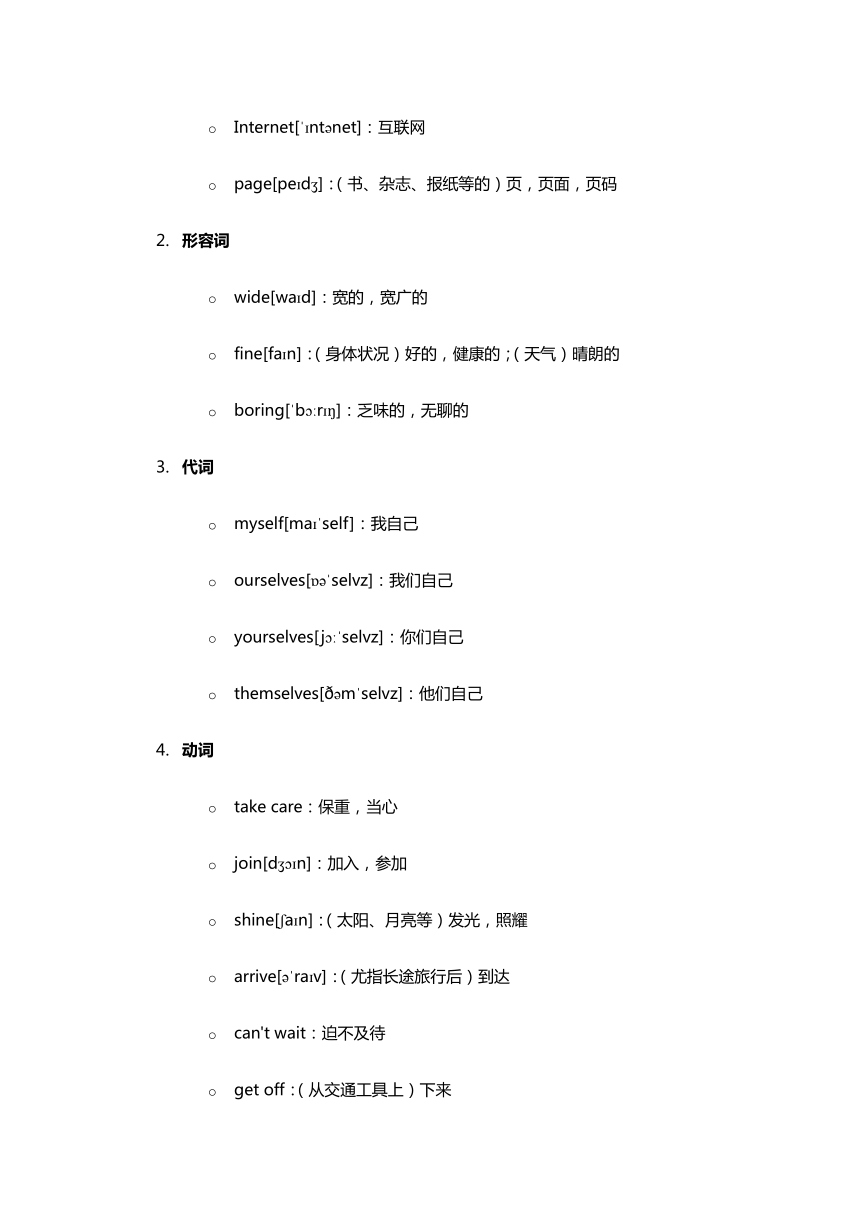Unit3-4期末复习2024-2025学年牛津译林版英语八年级上册
文档属性
| 名称 | Unit3-4期末复习2024-2025学年牛津译林版英语八年级上册 |  | |
| 格式 | docx | ||
| 文件大小 | 23.8KB | ||
| 资源类型 | 教案 | ||
| 版本资源 | 牛津译林版 | ||
| 科目 | 英语 | ||
| 更新时间 | 2024-12-29 19:52:30 | ||
图片预览




文档简介
2024-2025学年牛津译林版英语八年级上册 Unit3-4期末复习
Unit 3 A day out
一、词汇
名词
Australia[ s tre l ]:澳大利亚
coffee[ k fi]:咖啡
top[t p]:(物体的)顶部,上面
president[ prez d nt]:总统,国家主席
steel[sti l]:钢
ton[t m n]:吨
model[ m dl]:模型
journey[ d ni]:旅行,旅程
place of interest[ ple s v ntr st]:名胜古迹
sight[sa t]:(尤指值得看的)风景,名胜
culture[ k lt (r)]:文化
Internet[ nt net]:互联网
page[pe d ]:(书、杂志、报纸等的)页,页面,页码
形容词
wide[wa d]:宽的,宽广的
fine[fa n]:(身体状况)好的,健康的;(天气)晴朗的
boring[ b r ]:乏味的,无聊的
代词
myself[ma self]:我自己
ourselves[ selvz]:我们自己
yourselves[j selvz]:你们自己
themselves[ m selvz]:他们自己
动词
take care:保重,当心
join[d n]:加入,参加
shine[ a n]:(太阳、月亮等)发光,照耀
arrive[ ra v]:(尤指长途旅行后)到达
can't wait:迫不及待
get off:(从交通工具上)下来
短语
enjoy oneself[ n d w n self]:过得愉快,玩得高兴
take care of:照顾,照料
by oneself:独立地,独自
not believe one's eyes:不敢相信自己的眼睛(非常惊讶)
二、句型与语法
现在进行时态表示将来
结构:be(am/is/are)+动词-ing形式
用法:表示按计划或安排将要发生的动作,常与时间状语this afternoon, tomorrow, next week等连用。
例句:
We're going to the top of the Eiffel Tower this afternoon.(今天下午我们要登上埃菲尔铁塔。)
Mary isn't here at the moment. She is coming later.(玛丽此刻不在这儿,她一会儿就来。)
形容词的同级比较
结构:A+be动词+as+形容词原级+as+B
用法:表示两者在某方面相同或相似。
例句:
The bus is as comfortable as those in the USA.(这辆公共汽车和美国的公共汽车一样舒适。)
The model Sydney Opera House looks as wonderful as that in Australia.(悉尼歌剧院的模型看起来与澳大利亚的那座一样棒。)
with复合结构
结构:with+名词+形容词/副词/介词短语/动词-ing形式
用法:在句中作状语,表示伴随情况。
例句:
With your support, we will win!(在你们的支持下我们会获胜!)
With the help of my friends, I finished the work on time.(在朋友们的帮助下,我按时完成了工作。)
hope的用法
结构:hope+to do sth./hope+从句
用法:表示可以实现或能达到的希望。
例句:
We hope you can join us.(我们希望你能加入到我们中间。)
I hope you can give me some advice.(我希望你能给我一些建议。)
反身代词
用法:反身代词在人称和数上要与它所指代的名词或代词保持一致,在句中作宾语、表语或同位语。
例句:
We enjoyed ourselves at the party.(我们在派对上玩得很开心。)
She teaches herself English.(她自学英语。)
三、知识点拓展
交通工具的表达方式
by+交通工具(名词):表示乘坐某种交通工具。
例句:
I go to school by bus.(我乘公交车上学。)
They will travel by plane.(他们将乘飞机旅行。)
形容词和副词的最高级
结构:the+形容词/副词最高级+(名词)+(in/of短语)
用法:表示三者或三者以上的人或物中最……的一个。
例句:
She is the most popular student in our class.(她是我们班最受欢迎的学生。)
He runs the fastest of all the students.(他是所有学生中跑得最快的。)
邀请与应答
邀请:
Would you like to...?
Why not...?
How about...?
Let's...
应答:
Yes, I'd love to.(接受邀请)
I'd love to, but...(委婉拒绝)
Sorry, I can't.(直接拒绝)
Unit 4 Wild animals
一、词汇
名词
wildlife[ wa ldla f]:野生动植物
giant panda[ d a nt p nd ]:大熊猫
reserve[r z v]:保护区
loss[l s]:丧失,损失
habitat[ h b t t]:栖息地
danger[ de nd (r)]:危险
protection[pr tek n]:保护
zoo[zu ]:动物园
cage[ke d ]:笼子
形容词
wild[wa ld]:野生的
endangered[ n de nd d]:濒危的
safe[se f]:安全的
动词
lose[lu z]:失去,丧失
provide[pr va d]:提供
短语
in danger:处于危险之中
be in danger of:处于……的危险之中
provide sth. for sb.:为某人提供某物
二、句型与语法
现在进行时态表示正在进行的动作
与Unit 3相同,表示正在进行的动作或状态。
例句:
The pandas are eating bamboo now.(熊猫们现在正在吃竹子。)
Look! The birds are flying in the sky.(看!鸟儿们正在天空中飞翔。)
情态动词should的用法
结构:should+动词原形
用法:表示道义上的义务、要求或推测。
例句:
We should protect wildlife.(我们应该保护野生动植物。)
She should be in the classroom now.(她现在应该在教室里。)
被动语态
结构:be动词+动词的过去分词
用法:表示动作的承受者。
例句:
Pandas are protected in the reserve.(大熊猫在保护区里受到保护。)
The animals are kept in cages in the zoo.(这些动物被养在动物园的笼子里。)
祈使句
结构:动词原形+其他成分
用法:表示请求、命令、劝告、警告等。
例句:
Don't lose hope.(不要失去希望。)
Let's work together to protect wildlife.(让我们一起努力保护野生动植物。)
Unit 3 A day out
一、词汇
名词
Australia[ s tre l ]:澳大利亚
coffee[ k fi]:咖啡
top[t p]:(物体的)顶部,上面
president[ prez d nt]:总统,国家主席
steel[sti l]:钢
ton[t m n]:吨
model[ m dl]:模型
journey[ d ni]:旅行,旅程
place of interest[ ple s v ntr st]:名胜古迹
sight[sa t]:(尤指值得看的)风景,名胜
culture[ k lt (r)]:文化
Internet[ nt net]:互联网
page[pe d ]:(书、杂志、报纸等的)页,页面,页码
形容词
wide[wa d]:宽的,宽广的
fine[fa n]:(身体状况)好的,健康的;(天气)晴朗的
boring[ b r ]:乏味的,无聊的
代词
myself[ma self]:我自己
ourselves[ selvz]:我们自己
yourselves[j selvz]:你们自己
themselves[ m selvz]:他们自己
动词
take care:保重,当心
join[d n]:加入,参加
shine[ a n]:(太阳、月亮等)发光,照耀
arrive[ ra v]:(尤指长途旅行后)到达
can't wait:迫不及待
get off:(从交通工具上)下来
短语
enjoy oneself[ n d w n self]:过得愉快,玩得高兴
take care of:照顾,照料
by oneself:独立地,独自
not believe one's eyes:不敢相信自己的眼睛(非常惊讶)
二、句型与语法
现在进行时态表示将来
结构:be(am/is/are)+动词-ing形式
用法:表示按计划或安排将要发生的动作,常与时间状语this afternoon, tomorrow, next week等连用。
例句:
We're going to the top of the Eiffel Tower this afternoon.(今天下午我们要登上埃菲尔铁塔。)
Mary isn't here at the moment. She is coming later.(玛丽此刻不在这儿,她一会儿就来。)
形容词的同级比较
结构:A+be动词+as+形容词原级+as+B
用法:表示两者在某方面相同或相似。
例句:
The bus is as comfortable as those in the USA.(这辆公共汽车和美国的公共汽车一样舒适。)
The model Sydney Opera House looks as wonderful as that in Australia.(悉尼歌剧院的模型看起来与澳大利亚的那座一样棒。)
with复合结构
结构:with+名词+形容词/副词/介词短语/动词-ing形式
用法:在句中作状语,表示伴随情况。
例句:
With your support, we will win!(在你们的支持下我们会获胜!)
With the help of my friends, I finished the work on time.(在朋友们的帮助下,我按时完成了工作。)
hope的用法
结构:hope+to do sth./hope+从句
用法:表示可以实现或能达到的希望。
例句:
We hope you can join us.(我们希望你能加入到我们中间。)
I hope you can give me some advice.(我希望你能给我一些建议。)
反身代词
用法:反身代词在人称和数上要与它所指代的名词或代词保持一致,在句中作宾语、表语或同位语。
例句:
We enjoyed ourselves at the party.(我们在派对上玩得很开心。)
She teaches herself English.(她自学英语。)
三、知识点拓展
交通工具的表达方式
by+交通工具(名词):表示乘坐某种交通工具。
例句:
I go to school by bus.(我乘公交车上学。)
They will travel by plane.(他们将乘飞机旅行。)
形容词和副词的最高级
结构:the+形容词/副词最高级+(名词)+(in/of短语)
用法:表示三者或三者以上的人或物中最……的一个。
例句:
She is the most popular student in our class.(她是我们班最受欢迎的学生。)
He runs the fastest of all the students.(他是所有学生中跑得最快的。)
邀请与应答
邀请:
Would you like to...?
Why not...?
How about...?
Let's...
应答:
Yes, I'd love to.(接受邀请)
I'd love to, but...(委婉拒绝)
Sorry, I can't.(直接拒绝)
Unit 4 Wild animals
一、词汇
名词
wildlife[ wa ldla f]:野生动植物
giant panda[ d a nt p nd ]:大熊猫
reserve[r z v]:保护区
loss[l s]:丧失,损失
habitat[ h b t t]:栖息地
danger[ de nd (r)]:危险
protection[pr tek n]:保护
zoo[zu ]:动物园
cage[ke d ]:笼子
形容词
wild[wa ld]:野生的
endangered[ n de nd d]:濒危的
safe[se f]:安全的
动词
lose[lu z]:失去,丧失
provide[pr va d]:提供
短语
in danger:处于危险之中
be in danger of:处于……的危险之中
provide sth. for sb.:为某人提供某物
二、句型与语法
现在进行时态表示正在进行的动作
与Unit 3相同,表示正在进行的动作或状态。
例句:
The pandas are eating bamboo now.(熊猫们现在正在吃竹子。)
Look! The birds are flying in the sky.(看!鸟儿们正在天空中飞翔。)
情态动词should的用法
结构:should+动词原形
用法:表示道义上的义务、要求或推测。
例句:
We should protect wildlife.(我们应该保护野生动植物。)
She should be in the classroom now.(她现在应该在教室里。)
被动语态
结构:be动词+动词的过去分词
用法:表示动作的承受者。
例句:
Pandas are protected in the reserve.(大熊猫在保护区里受到保护。)
The animals are kept in cages in the zoo.(这些动物被养在动物园的笼子里。)
祈使句
结构:动词原形+其他成分
用法:表示请求、命令、劝告、警告等。
例句:
Don't lose hope.(不要失去希望。)
Let's work together to protect wildlife.(让我们一起努力保护野生动植物。)
